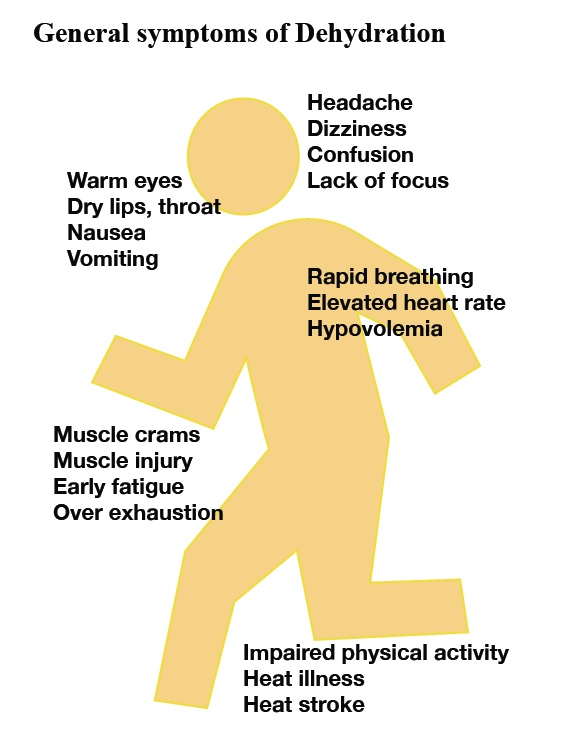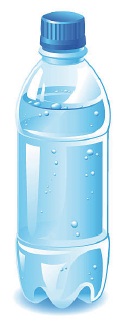Many people are unaware that Water is a nutrient, which plays a crucial metabolic role in the human body. The total body water content varies from 50-70% of total body weight.
Both internal factors, such as muscle contraction (metabolic rate) and external factors, such as temperature, humidity, wind speed, clothing worn, are responsible for increase in body temperature. During physical activity, such as running, excess amount of heat is generated inside the body as result of metabolic processes. It is well documented that, during physical activity only 20-30% of energy is used for muscle contraction and rest of the energy is dissipated as heat. Sweating is an effective mechanism of dissipating excess body heat to cool down exercising muscles. Sweating results in loss of body water and body salts (electrolytes) known as Dehydration. Exercise induced mild dehydration is inevitable. But problem occurs when individual fails to rehydrate and continues to exercise, which may lead to sever dehydration. It may result in heat related muscle injuries. In long duration endurance sports like marathon running, people are ignorant about their hydration strategies, often experience muscle crams during run and muscle soreness, stiffness and over exhaustion post run. Often misinterpreting this signs to lack of proteins in diet.
Based on scientific evidence it is an established fact that, leading cause of muscle fatigue, muscle cramp, heat exhaustion, heat stroke resulting impaired running performance is severe Dehydration. All these catastrophic consequences of dehydration can easily be overcome simply by strategically rehydrating during run.
In any sport’s, thumb rule is to start your activity in well hydrated state. The optimal levels of body water and body salts are not only necessary for physical performance but are also mandatory for mental concentration. According to scientific literature, during long distance running sweating rate can be as high s 3L/hour or more. Therefore, during marathon running it is absolutely necessary to monitor your sweat losses and start rehydrating before anticipated fatigue to maintain your running pace. However, amateur runners relay completely on the thirst as an indicator of level of hydration, which can be blunted during endurance activity. Sensation of thirst is triggered after mild dehydration sets in. Hence, thirst is poor indicator of the level of hydration. Runners should not completely rely only on the thirst as a reminder to drink, during running events.


It is very difficult to calculate daily fluid requirement as a general preposition because it is multifactorial phenomena and it varies from person to person. To understand your daily requirement, monitor hydration status. * Your urine may be dark if your are consuming vitamin supplements; in that case urine volume is better indicator than colour. Search the web for ‘urine colour chart’
Check colour of first urine passed in the morning
* Dark yellow - dehydration
* Pale yellow - optimal levels
OR
Check body weight early morning
* Lesser than usual — dehydration
Before run- if you are dehydrated then you must drink little extra water before your start running, although you may not feel thirsty, but this is your reserved fluid.
| 1- 2 hours before | Approx. 1-1.5 L | Plain water, diluted fruit juice, coconut water, Nimbu sharbat |
| 20 minuts before | Approx 150-200ml | Plain water, Sports drink |
Tip- empty your bladder 15-20 min before your start, as the water in the bladder cannot be used by the body. It becomes a baggage.
During run- start rehydrating 30 minutes prior to anticipated fatigue, to keep up the running pace. Hydration stations can act as reminder to drink.
| every 15-20 min
(practice this during trial run) |
Approx 150-200ml (3-4 sips) | Sports drink Is better than plain water. Plain water with carbohydrate gel. |
After run - Rehydration is an effective strategy for faster recovery. It is important to replenish fluid losses and restore electrolytes to reduce muscle soreness. Quantity of fluid is always in accordance with your sweat rate.
| Begin immediately | Compensate sweat loss Tip - loss of body weight in grams replenish with equal amounts of fluid ( with electrolytes) in millilitres |
Sports drink, salty beverages, diluted fruit juice, add pinch of salt in fresh coconut water, buttermilk Plain water |
It is important to note that, it is better to drink small volumes of fluids frequently rather than drinking large volumes occasionally.
Over hydration can lead to Hyponatremia (low levels of sodium). Over hydration dilutes body fluids and creates sodium imbalance; blood sodium levels become abnormally low. This is commonly experienced by individuals who over drink plain water before and/or during run more than their sweat losses, runners running at slow pace, slaty sweaters (who have higher sweat loss of sodium) fails to replace electrolyte losses.
To prevent hyponatremia, avoid water loading before run as well as during run. Opt for sports drink which is a combination of water, electrolytes and carbohydrate to rehydrate during run. If you are salty sweater then consume salted foods before run and add a pinch of salt in your drink. Choose a sport drink with higher sodium content than the standard sports drink. Monitor your overall water intake.
However,There are no standard amounts recommended for fluid intake obviously because ‘one size does not fit all’. Thus, every runner needs to fine-tune above guidelines and practice them during trial runs to train their gut in order to appropriately adjust fluid intake during the run.
APURVA KUMBHAKONI
Sports Nutritionist
Mumbai
This fact sheet contains general information. Please consult qualified sports nutritionist for personal requirements. Not meant for being used by persons with any adverse medical condition/history. © Apurva Kumbhakoni.